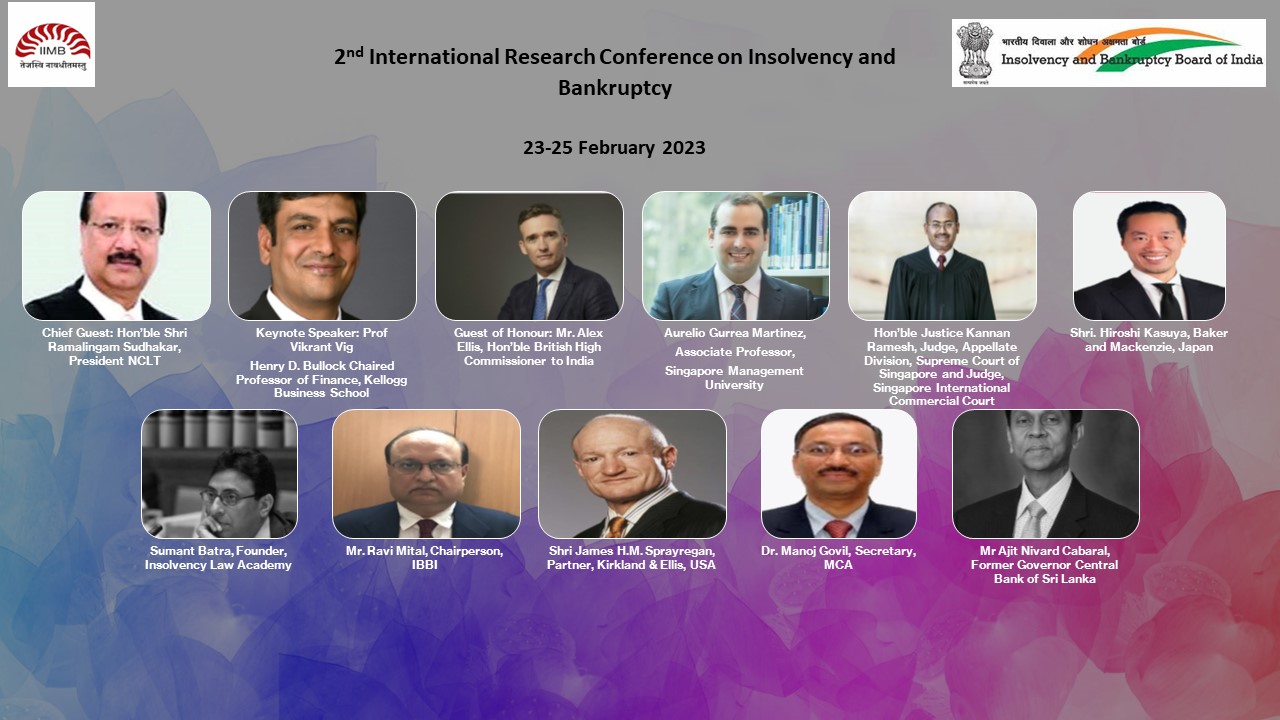Call for Papers
The institutional mechanisms have handled COVID-19 pandemic induced disruptions. However, the critical view is judicial discretion and delays are making IBC less effective than what was envisaged, emphasising on addressing judicial reforms and administrative bottlenecks.
Insolvency resolution regime is an important part of well-governed polity and efficient economy. It enables creation of an environment that is conducive for entrepreneurship and appropriate risk taking, while safeguarding creditors, as well as providing expertise and service for businesses and persons facing financial stress.
A few academic studies (Bose, Filomeni and Mallick (2021), Ghosh (2022) and Jose et al. (2020)) have been providing divergent empirical evidence and classic cases are evolving in interpretation of interest of multiple stakeholders. However still multiple issues on effectiveness of institutional and legal mechanisms and its impact on corporate finance and interests of stakeholders are yet to be addressed empirically.
Academic knowledge, empirical evidence from rigorous analysis and expertise can help inform, design, improve and test policy and ultimately make government policy better. Rigorous research can bring evidence to support policy makers in addressing challenges. Thus this conference is a forum for academic researchers, professionals, financial creditors, policy makers to discuss on the impending issues on making IBC more effective institutional mechanism.
This conference is inviting research papers in the area of Corporate finance, distress, resolution mechanism, valuation issues and protection of multiple stakeholders.
-
Venue
The 2nd International Conference on Insolvency and Bankrutpcy is going to be held at the Indian Institute of Management Bangalore during February 23rd -25th . The conference is a joint effort of Indian Institute of Management Bangalore (IIMB and Insolvency and Bankruptcy Board of India. This is similar to the way the first conference organized at IIM Ahmedabad. -
Participants
The conference is open to individuals from all disciplines interested and involved in insolvency and bankruptcy process and its multi-disciplinary issues. Conference organisers encourages, professionals and scholars to participate and present their papers in any of the topics listed above. There is no participation fee. Professionals, scholars, and students can also register and participate in the event without presenting the paper. -
Conference Facilities
All the registered participants will be given conference materials, and food and snacks for two days. Participation certificate will be issued on request.



Important Dates
- Proposal submission: 15th September, 2022
- Acceptance/ Rejection notification: 10th October 2022
- Submission of full papers: 16th December, 2022
- Final paper acceptance/ rejection notification: 16th January, 2023
- Presentation of the paper: 24th & 25th February, 2023
- Submission of revised paper: 17th March 2023
"Proposals Received for the Conference216"

Conference Language
Conference Team
- Prof. Jayadev M, Indian Institute of Management Bangalore
- Dr. Aishwarya Krishna, Indian Institute of Management, Bangalore
- Mr. Ritesh Kavdia, Insolvency and Bankruptcy Board of India
- Mr. Deepak Rao, Insolvency and Bankruptcy Board of India
- Mr. Sushanta Kumar Das, Insolvency and Bankruptcy Board of India
Pre-Conference Tutorials
23rd February 2023 (Thursday)
10:00 AM - 01:00PM
Contact:
Insolvency and Bankruptcy Board of India
Research Division
- 2nd Floor, Jeevan Vihar Building Sansad Marg, New Delhi 110001
- 011 23462999
- research@ibbi.gov.in
Indian Institute of Management, Bangalore
- ibbiconf@iimb.ac.in
Contact for accommodation, logistics and support at IIMB

